GOP Looking To Overhaul Primary, Convention Process Ahead Of 2016
Republicans have some good ideas about overhauling how they pick a nominee. Unfortunately, it's hard to see how most of them can be enforced.
More than any other before it, the 2012 Republican primary process seemed to show in sharp detail the extent to which the process by which our two major parties pick their nominees has gotten out of control. The Iowa and New Hampshire primaries, which for decades didn’t occur until the opening weeks of February, once again occurred within days of the start of the year and even before the BCS Championship Game had occurred. As a result, states like Florida, Michigan, and South Carolina, moved their primary (or caucus in the case of Iowa) dates up to January notwithstanding efforts by the Republican National Committee to limit the number of contests occurring that early in the year.
This led to a food fight among other states to schedule their own primaries at a point where it would still have some kind of influence on the selection of the nominee. In many of some states, well organized groups of candidates with little actual popular support, principally supporters of Ron Paul, attempted to hijack state conventions and put supporters of their candidate on the slate of delegates sent to the Republican National Convention even though other candidates had out-performed the caucus or primary that delegate allocation is supposed to be based upon. This actually happened in 2012 in Iowa, and nearly happened in other states, although it ended up having no significant impact on the convention itself.
At the convention this led party leaders to change delegate allocation rules so that allocation would more closely track the outcome of primaries and caucuses, and giving winning candidates more control over the make-up of delegate slates. Even before the primary season had started, the process was inundated with a debate schedule that had begun in May of 2011 and ended with more than a dozen multi-candidate debates by the end of that year that ended up being more sideshow than anything else. Finally, the party’s nominee found himself hobbled to some extent by the fact that he was legally unable to spend any of his General Election Funds until the end of August because of the late scheduled convention, which stood in contrast to an earlier era when party conventions were typically held in June and July.
Taking all of this into account, there has been much talk inside the Republican Party about reforming the primary and convention process, and now they appear to have a plan coming together:
In a series of closed-door meetings since August, handpicked members of the Republican National Committee have been meeting with party Chairman Reince Priebus in Washington to hash out details of a sweeping plan to condense the nominating calendar, severely punish primary and caucus states that upend the agreed-upon voting order and potentially move the party’s national convention to earlier in the summer, with late June emerging as the ideal target date.
No party convention has been held that early since the steamy summer of 1948, when Republicans nominated Thomas Dewey as their standard bearer in Philadelphia.
The 17-member special rules subcommittee tasked with reforming the nominating process, appointed with little fanfare at the RNC’s summer meeting in Boston, is also considering ways to limit the number of Republican primary debates in 2016, though the group has yet to agree to any specific rules related to debates. The 2012 campaign saw an eye-popping 20 Republican debates, in addition to an array of multicandidate forums.
Priebus and other top party figures have made no secret of their desire to scale back the number of debates, which offered little-known candidates such as Michele Bachmann and Herman Cain a chance to shine but forced Mitt Romney, the eventual nominee, to publicly stake out a number of conservative positions that came back to haunt him in the general election.
The meat of the proposals being debated have to do with the eternal problem that both the RNC and the DNC have been dealing with since the 2008 election, the increasingly early scheduling of primaries and caucuses and the efforts of states to leapfrog each other to increase their influence over the process:
Among the rules amendments taking shape:
— The first four early-voting states — Iowa, New Hampshire, South Carolina and Nevada — would continue to hold their contests in February.
To prevent other states from jumping the order and compelling the first four to move their dates even earlier as they did in 2012, any state that attempts to hold its nominating contest before March 1 would have their number of delegates to the convention slashed to just nine people or, in the case of smaller states, one-third of their delegation — whichever number is smaller.
“It’s the death penalty,” said one member of the subcommittee. If Florida violates RNC rules and holds its primary in February, its 99-member delegation would all but vanish.
— Any state holding a primary or caucus during the first two weeks of March must award its delegates proportionally, rather than winner-take-all.
The measure is designed to prevent a candidate from catching fire in the early states and then riding a burst of momentum to winner-take-all victories in expensive, delegate-rich states such as Florida or Texas. The early March window would give underfunded, insurgent candidates a chance to prove their mettle.
“It will allow a grassroots candidate to stay in the race and try to raise money and score some wins,” said Smack. “If they can’t score wins by that time, they probably need to pack it in and try again four years later.”
— States holding a contest after March 15 can decide to award their delegates however they see fit.
Both parties, of course, have tried some variation on these types of rules before with limited success. In many notable cases, the threat of sanctions in the form of cuts to the number allocated delegates had almost no impact on a state’s decision schedule an earlier contest than the national party would prefer and the effort to impose sanctions became a matter of contention for the committee designated to control credentials to the party convention to deal with long after the nomination had ended. By this point, of course, the nominee had largely been unofficially decided, even when it came to the seemingly endless Democratic nomination fight of 2008. Because of that, there was much pressure on the relevant committees to relax the sanctions on the states who had scheduled their primaries early given that it would not have any real impact on the outcome of the convention. Additionally, its unclear just how much of a punishment limiting the number of delegates actually is compared to the press and media coverage a state gets when it schedules its primary or caucus early in the process at a point when it is arguably likely to have a far bigger impact on the race, and result in far more media coverage and spending inside the state in question, than it would than if it were held later in the process. As long as that’s true, states are likely to be willing to risk paying the price of the rather limited sanctions that national parties are able to place upon states that don’t follow scheduling rules.
Another proposed rule change is one that seems to make eminent sense:
— The Republican National Convention will be held either in late June or early July, though ideally on a date before the July 4 holiday. The decision on where to hold the convention will be made at a later date by a separate RNC panel, but Las Vegas and Kansas City are seen as two early frontrunners. Party officials said each city’s host committee seems willing and able to raise the nearly $60 million needed to fund a sprawling convention.
While this would be far earlier than conventions have been held in the past several Presidential cycles it would, as I’ve noted before, be far more consistent with the history of when conventions used to be held:
It wasn’t always this way. In 1980, the Republican Convention was in mid-July while the Democratic Convention was in mid-August. In 1984, the order was reversed, with the DNC in mid-July and the RNC in mid-August. The same schedule was adhered to for the 1988 conventions and the 1992 conventions. In 1996, the schedule changed slightly with the Republican convention in mid-August and the Democratic convention starting about two weeks later. In 2000, the Republicans held their convention the first week of August, and the Democrats went in mid-August. It was in 2004 when the pattern started to change, that year the Democrats held their convention the first week of August, but the GOPdidn’t start their convention until August 30th. Then, of course, four years ago, both parties pushed their convention to the very end of August.
That pattern was repeated virtually identically in 2012, of course, and we saw in both cases that the conventions were disrupted in some way by tropical storms, even the Republican National Convention in 2008, which was held in Minnesota, some 1200 miles away from where Hurricane Gustav was slamming into the Gulf Coast. As would happen four years later with Hurricane Isaac and its more direct threat to the convention in Tampa, Gustav resulted in the first day of the convention being mostly canceled and several speakers not being able to appear at all due their responsibilities in their home states. While there’s no guarantee that there won’t be a tropical storm in late June or early July of 2016 that would have a similar impact on a convention scheduled at that time, the odds are much lower. An additional advantage of an earlier convention is that it would allow the party nominee to begin spending General Election funds, and matching funds from the FEC, at an earlier date. Many analysts noted last year that Mitt Romney was hobbled by the fact that he was unable to fully respond to the attacks against him during the summer of 2012 because he was legally unable to spend any of the large sums raised for the General Election campaign until he was officially nominated at the convention in late August. This would solve that problem, and would allow a national campaign for President to hit the ground running at a far earlier date.
Finally, the party is once again talking about trying to limit the number of debates, and who conducts them:
One proposal being weighed by the RNC members would involve sanctioning a small handful of debates while penalizing candidates who participate in any nonsanctioned GOP debate by stripping them of one-third of their delegates to the national convention.
There is also a “heavy appetite” to have a say over which journalists should be allowed to moderate the debates, said one Republican familiar with the ongoing discussions.
“There is a definitely a consensus for Reince’s objective to have less debates and have control over how and who we have run our debates, rather than just turning it over to X, Y or Z network and having a guy moderate who’s going to just dog you for two hours,” said the Republican, who requested anonymity to discuss the sensitive and not-yet-finalized rules changes.
This issue was also raised in the GOP’s much talked about post-2012 autopsy which was released earlier this year. The argument, essentially, is that the plethora of debates leading up to the start of the 2012 campaign ended up doing more harm than good and that the party was somehow harmed by the fact that the debate were conducted by news organizations rather than by people sympathetic to the GOP and conservative candidates. As I noted at the time, though, it’s hard to see what the RNC can do about any of this. In the end, they have no actual control over the debate schedule itself. These debates are usually sponsored either in whole or in part by news organizations or, in many cases, by state party organizations in states like Iowa and Florida. Candidates are invited by the sponsors and can choose either to appear or not based on their own campaign strategy. There really isn’t anything the Republican National Committee can do about either the debate schedule or the identity of the organizations sponsoring them. At most, they could set up a series of RNC-sanctioned debates around the country that they’d have more control over, but that’s no guarantee that CNN, MSNBC, ABC and other media groups wouldn’t continue to schedule their own debates, and there would be little the RNC could do to prevent candidates from accepting invitations to those debates. Indeed, unless you’re the frontrunner in the campaign at the time there would be little reason for a candidate to turn down a debate invitation since it would mean more free media time, and a frontrunner who turned down a debate invitation would quickly be accused of dodging questions and their very absence from the debate would become the subject of the debate itself. When it comes to candidate debates in these types of races, if you schedule it the candidates will appear, and there’s little the RNC (or the DNC) can do about that.
Most of the ideas the RNC is considering here are good ones, but it’s unclear how most of them could be implemented. There is certainly room for improvement in both the primary and debate process but there’s little that the RNC can do to actually control things here unless there’s virtually unanimous agreement among the parties involved, which seems unlikely. This means, unfortunately, that we’re likely to see another round of early primaries in January 2016 even though it would make far more sense for the process to start in February, and that we’ll be subjected to another two dozen or so multi-candidate “debates” where most of the candidates get less than three minutes to actually answer substantive questions. There is one thing that the RNC can control, though, and that’s the convention process. A convention in late June or early July makes far more sense than one in late August or early September, so hopefully that is one change that will be made and which the Democratic National Committee will copy. As for the others, well we’re probably just going to have to get used to the idea of a primary calendar that starts far, far earlier than it used to.
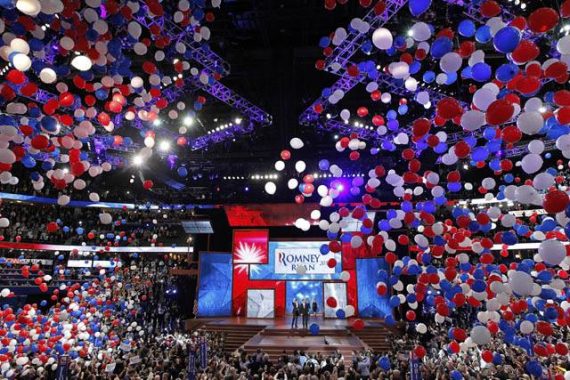

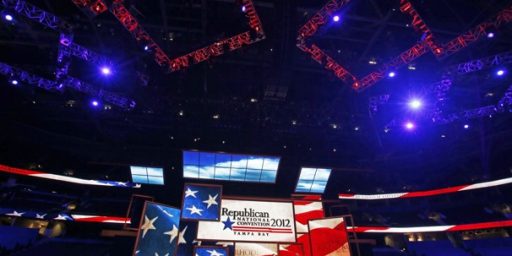
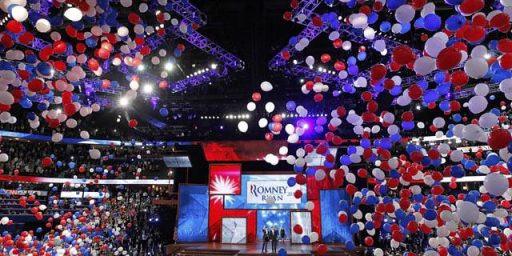
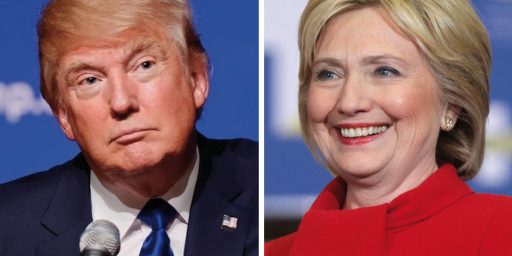
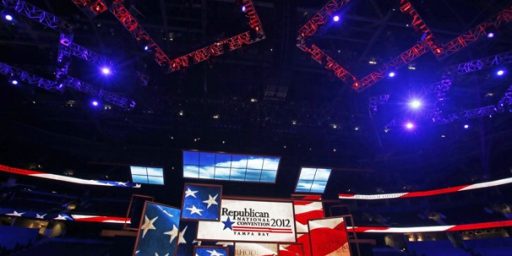
“The Iowa and New Hampshire primaries, which for decades didn’t occur until the opening weeks of February, once again occurred within days of the start of the year and even before the BCS Championship Game had occurred. As a result, states like Florida, Michigan, and South Carolina, moved their primary (or caucus in the case of Iowa) dates up to January notwithstanding efforts by the Republican National Committee to limit the number of contests occurring that early in the year.”
This has cause and effect backwards. The other states started to push forward first. To keep the historical positions as first caucus and first primary (which I believe are enshrined in state law for both states), Iowa and New Hampshire were then compelled to move theirs forward as well. IIRC, Iowa’s caucus date was not finally set until around Thanksgiving, as it needed to keep pushing its date up to stay first.
Exceptionally well written account, Mr Mataconis. This was particularly thoughtful:
I’m quite agnostic over advertising’s effectiveness, but I’m a true believer in the power of Who Gets Paid. In this case, it’s several more weeks of bounty for party PR firms.
I think that is a very strong selling point.
Until the election season is profoundly shortened, including the inane media speculation on the next cycle that begins the instant an election is complete, these efforts to change the process are meaningless.
I wonder if we wouldn’t do better by just flipping a coin….
They should start determining the order of these things by lottery, the number of lots being predicated on how much the state party donates to the national party. I still have no clue why Iowa, New Hampshire, and South Carolina are considered representative or bellwether of the country’s voting habits.
I’m a big fan of regional primaries-10 over 5 months, with a rotaing schedule as to who goes first. Probably never happen , though
@stonetools:
I like that idea too and have proposed it in the past, but it’s not easy to bring about without near unanimous agreement among not just the state parties and their leadership, but also the legislatures and Governors of each of these states.
@Moosebreath:
Indeed, at one point there was a threat that Iowa and New Hampshire would schedule their respective contests for a date before Christmas in 2011. Which would have been absurd.
Some people think it was good for the Republican Party to work themselves into a lather during the primaries. They’d like to see it happen again. Their advice to the head of the RNC would be, “lather, Reince: repeat”.
Here’s a rule: If your state holds its primary before March, then Sarah Palin, Christine O’Donnell, Michele Bachmann, Richard Mourdock, Rick Santorum, and Todd Akin will move to your state and run for public office.
In other words, it’s the “let’s do everything that we can to alleviate our Tea Party problem” plan.
Works for me.
I think the hugely buffed up sanctions would do the trick. If they truly decide that the penalty is to give Florida 9 delegates if they defy the schedule, Florida is much less likely to cause trouble. Smaller states may still be incentived to move their date, though. But besides Iowa and New Hampshire, they don’t get the coverage that Florida gets.
We’ll see if this works, if implemented.
@B. Minich: They’ll have to really mean it and stick to those sanctions. The record isn’t good. Despite the fact that Florida should have been sanctioned the other party let all of its Florida delegates in in 08, to avoid hard feelings.
@Doug Mataconis:
I guess the sign the logic doesn’t determine the process is that New Hampshire and Iowa hold their events in the deep mid winter and California votes in June….
Still there is some movement towards regional primaries. Super Tuesday is a Southern regional primary and the Potomac primary(Maryland, DC and VIrginia) is a mini-mid-Atlantic primary. Here’s hoping logic finally has its day. THe sheer expense of campaigning is finally, I think , going to move the parties to regional primaries, I think.
Who cares? Does anyone seriously believe that the Republicans have any chance of winning in 2016. That the media pays attention to the irrelevant Republicans shows how the media refuses to focus on what is relevant in politics today.
It would save everyone in the media money and time if they just ignored the Republican nominating process or even the presidential eleciton in 2016 and used the time to focus on governance, policy, and the future.
@HarvardLaw92: “In other words, it’s the “let’s do everything that we can to alleviate our Tea Party problem” plan. ”
Yes. My thought is that the single biggest change (that they probably could not make) would be to keep the clowns off of the stage. Newt and Cain were there to sell books; Bachman is somebody who can’t even win a statewide race (as was Ryan).
If I were the GOP leadership, and interested in winning, I’d restrict debates to people who are/have very recently been governors or Senators. If you can’t win your own state, then you don’t get to try out for the majors.